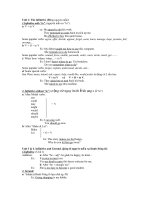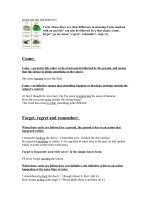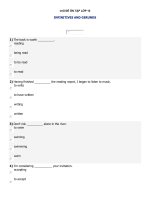Gerund or Infinitive as Object of Verb
Bạn đang xem bản rút gọn của tài liệu. Xem và tải ngay bản đầy đủ của tài liệu tại đây (71.66 KB, 2 trang )
<span class='text_page_counter'>(1)</span><div class='page_container' data-page=1>
<b>Gerund or Infinitive as Object of Verb? </b>
<b>VERBS THAT CAN HAVE </b>
<b>INFINITIVE OR GERUND </b>
<b>OBJECTS, </b><b>with little or no difference in meaning:</b>
<i><b>____ studying. </b></i>
<i><b>____ to study.</b></i>
can afford
can't bear
begin
cease
commence
continue
dread
hate
like
loathe
love
neglect
prefer
propose
(can't) stand
start
undertake
<b>VERBS THAT CAN HAVE </b>
<b>GERUND </b>
<b>OBJECTS, BUT NOT INFINITIVES:</b>(usually actual events, often past)
<i><b>_____ (his) studying</b></i>
gerund subjects (agents) are usually possessive (<i>his </i>, etc.)
admit
anticipate
appreciate
avoid
complete
consider
defend
delay
deny
detest
discuss
dislike
enjoy
escape
excuse his
finish
get through
give up
go on
can't help
imagine
involve
keep (on)
would like (him)
mention
(not) mind
miss
postpone
practice
put off
quit
recall
recollect
recommend
report
resent
resist
resume
risk
(can't) see
stop
suggest
take up
tolerate
understand
<b>VERBS THAT CAN HAVE </b>
<b>INFINITIVE </b>
<b>OBJECTS, BUT NOT GERUNDS:</b>(often suggesting a potential or unreal event)
<i><b>_______ to study</b></i>
him = infinitive must have a subject (agent)
for him = infinitive must have a subject introduced by <i>for </i>
(him) or (for him) = subject (agent) of infinitive is optional
(none of the above = verb is followed directly by the infinitive)
agree
aim
appear
appoint him
arrange (for him)
authorize him
ask (him)
beg (him)
(not) care
cause him
challenge him
choose (him)
claim
command
him
condescend
consent
convince him
dare (him)
decide
demand
deserve
desire
direct him
enable him
endeavor
expect (him)
fail
force him
get (him)
happen
hesitate
hire him
help him
hope
instruct him
intend
invite him
lead him
learn
long
manage
motivate him
need (him)
oblige him
offer
order him
pay him
persuade him
plan
prepare (him)
pretend
proceed
promise
refuse
remind him
resolve
seem
select him
send him
strive
struggle
swear
tell him
tend
threaten
train him
trust him
volunteer
vow
wait (for him)
want (him)
warn him
wish (him)
yearn
</div>
<span class='text_page_counter'>(2)</span><div class='page_container' data-page=2>
<i><b>________ studying</b></i>
actual:
first it happens; then there is mental
activity)
<i><b>________ to study. </b></i>
potential:
first there is mental activity about a possible
future event)
attempt
forget
mean
regret
remember
try
do it, hoping for success
do it, then have a mental lapse
it exists, it has a significance
do it, then feel bad
do it, then be aware of it
do it, hoping for success
make an effort, hoping to do it
have a mental lapse, and therefore not do
it
have an intention to do it
feel bad, but then do it
think about it, and then do it
make an effort, hoping to do it
<b>VERBS THAT CAN HAVE </b>
<b>INFINITIVE</b>
<b> OBJECTS</b><b> WITH AGENTS, OR </b>
<b>GERUNDS :</b>
<i><b>_______ studying </b></i>
<i><b>___ him to study</b></i>
advise
allow
encourage
</div>
<!--links-->









